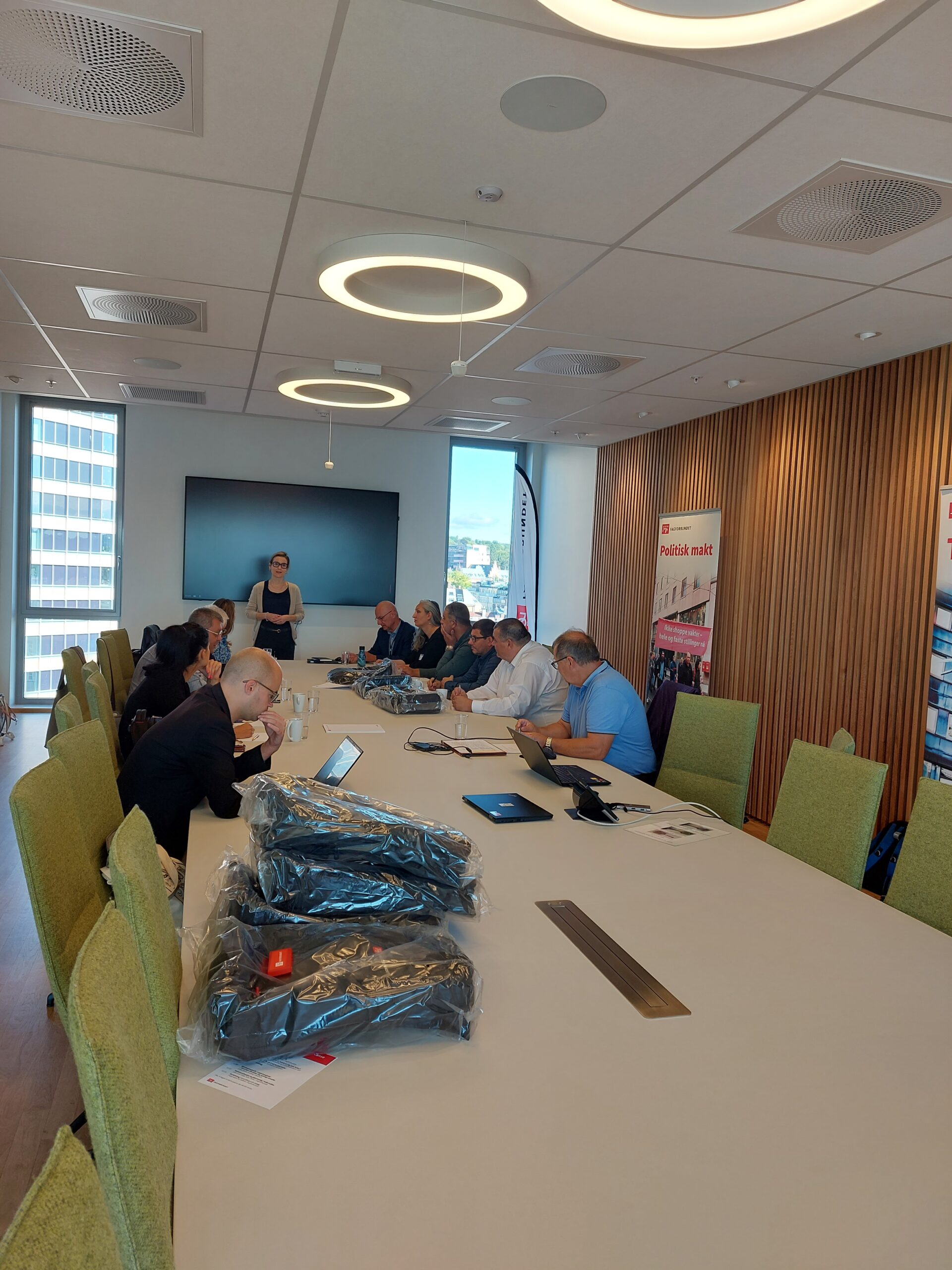Study visit of TUFEMIs delegation in Oslo
In the period 6 – 7 September 2022, a delegation of seven people from TUFEMI visited the project’s partner organization Fagforbundet. The visit was planned as activity of the project “Decent work’s latest challenge: risk and stress management”, funded by Innovation Norway.
During the exchange visit, both the structure and principles of work of Fagforbundet and the key elements of the Norwegian model, that make it so successful and effective, were presented. The first day included a presentation of the police union, which is part of Unio, as well as the role of municipalities and employers in collective bargaining, presented by KS.
The second working day continued with a presentation of the activity and the main challenges faced by TUFEMI in the social dialogue and working conditions, as well the program to fight and prevent cancer among firefighters in Norway. As part of the exchange visit, a fire station was also visited, where both the equipment of the fire trucks and the firefighters, were shown and working conditions were discussed.
The delegation from TUFEMI made several main conclusions as a result of the exchange visit, which are as follows:
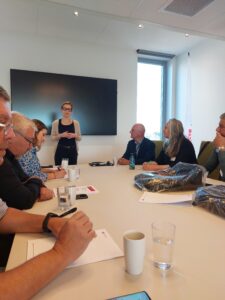 The extremely good trade union coverage in Norway is impressive, both in percentage, terms and in the different qualities and roles in which it is represented (public, private sector, education) and the very good profiling and differentiation of roles and activities between trade union organizations.
The extremely good trade union coverage in Norway is impressive, both in percentage, terms and in the different qualities and roles in which it is represented (public, private sector, education) and the very good profiling and differentiation of roles and activities between trade union organizations.
- The representation of employers was decided in an extremely interesting way in order to comply with the requirements for a tripartite dialogue. This is a practice that could be implemented in Bulgaria and the Ministry of the Interior, but it requires long-term work and concrete initiatives for sustainable change of the attitudes on the representatives of state administrations.
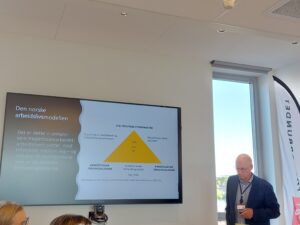 It is impressive how the partnership between trade union organizations is developed and the most interesting is the existing mechanism “to build and upgrade on what has been already achieved by other social partners” which put the focus of negotiations on the workers’ needs and improvement of their social rights and benefits. The very fact that a lecturer from another trade union had a presentation during our study visit , due to the TUFEMI has stated interest in the organizing of the police in Norway, is proof of the existence of constructivism and partnership in the relations between trade union organizations in Norway.
It is impressive how the partnership between trade union organizations is developed and the most interesting is the existing mechanism “to build and upgrade on what has been already achieved by other social partners” which put the focus of negotiations on the workers’ needs and improvement of their social rights and benefits. The very fact that a lecturer from another trade union had a presentation during our study visit , due to the TUFEMI has stated interest in the organizing of the police in Norway, is proof of the existence of constructivism and partnership in the relations between trade union organizations in Norway.
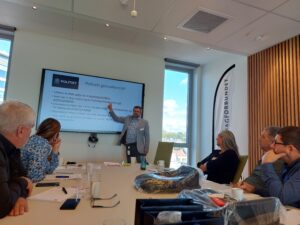 The main change in the way of thinking that must be brought about in Bulgaria is the realization by the representatives of the trade union organizations that the competition between them must be reduced to a “competition” for ideas in favor of the welfare of the workers, as well as the attitude that it is necessary all stakeholders to be open to other participants in order to find common solutions.
The main change in the way of thinking that must be brought about in Bulgaria is the realization by the representatives of the trade union organizations that the competition between them must be reduced to a “competition” for ideas in favor of the welfare of the workers, as well as the attitude that it is necessary all stakeholders to be open to other participants in order to find common solutions.
- Broad coverage and the availability of additional agreements, outside of the CLA, to guarantee rules in areas not affected by it is an exceptional way to protect the rights of all socio-economic groups.
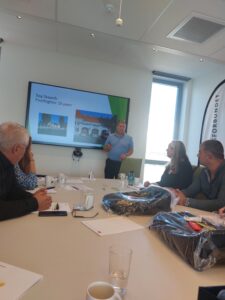 From an economic point of view, it is very interesting and valuable the principle of economic management ensuring the well-being of everyone, as well as the tactically correct action that negotiations on the CLA first are held on the remunerations in the most competitive sectors, as well as the principle that their results are decisive for the increase in wages in other sectors.
From an economic point of view, it is very interesting and valuable the principle of economic management ensuring the well-being of everyone, as well as the tactically correct action that negotiations on the CLA first are held on the remunerations in the most competitive sectors, as well as the principle that their results are decisive for the increase in wages in other sectors.
- The “Trust Reform” launched by the Government, aimed at reducing bureaucracy and “freeing up” time for professionals for their real work, is an initiative that we would certainly launch in the Ministry of Internal Affairs and in Bulgaria as a whole.
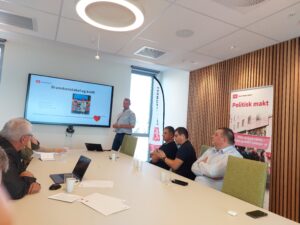 The program for the prevention of cancer among firefighters implemented by the Fagforbundet, as well as the statistics they have on the incidence and long-term follow-up of the employees’ condition is one of the initiatives that are very important and valuable for the Bulgarian Ministry of the Interior and the least that can to do is to start conversations between interested parties on these topics.
The program for the prevention of cancer among firefighters implemented by the Fagforbundet, as well as the statistics they have on the incidence and long-term follow-up of the employees’ condition is one of the initiatives that are very important and valuable for the Bulgarian Ministry of the Interior and the least that can to do is to start conversations between interested parties on these topics.
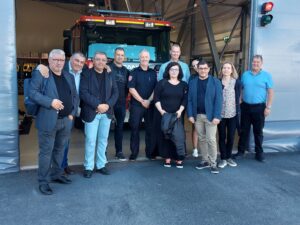 The differences between the working conditions and the social dialogue in Bulgaria and Norway are huge and they are not so much caused by the different welfare of the countries, but because of the difference in the way of thinking and the attitude towards the employees, employers and the government officials. While in Bulgaria, the employees of the Ministry of Internal Affairs are treated as a tool and are considered as easily replaceable contractors, in Norway, for the social partners, every single person is important and for them is a key element of the creation of the State of the welfare.
The differences between the working conditions and the social dialogue in Bulgaria and Norway are huge and they are not so much caused by the different welfare of the countries, but because of the difference in the way of thinking and the attitude towards the employees, employers and the government officials. While in Bulgaria, the employees of the Ministry of Internal Affairs are treated as a tool and are considered as easily replaceable contractors, in Norway, for the social partners, every single person is important and for them is a key element of the creation of the State of the welfare.

